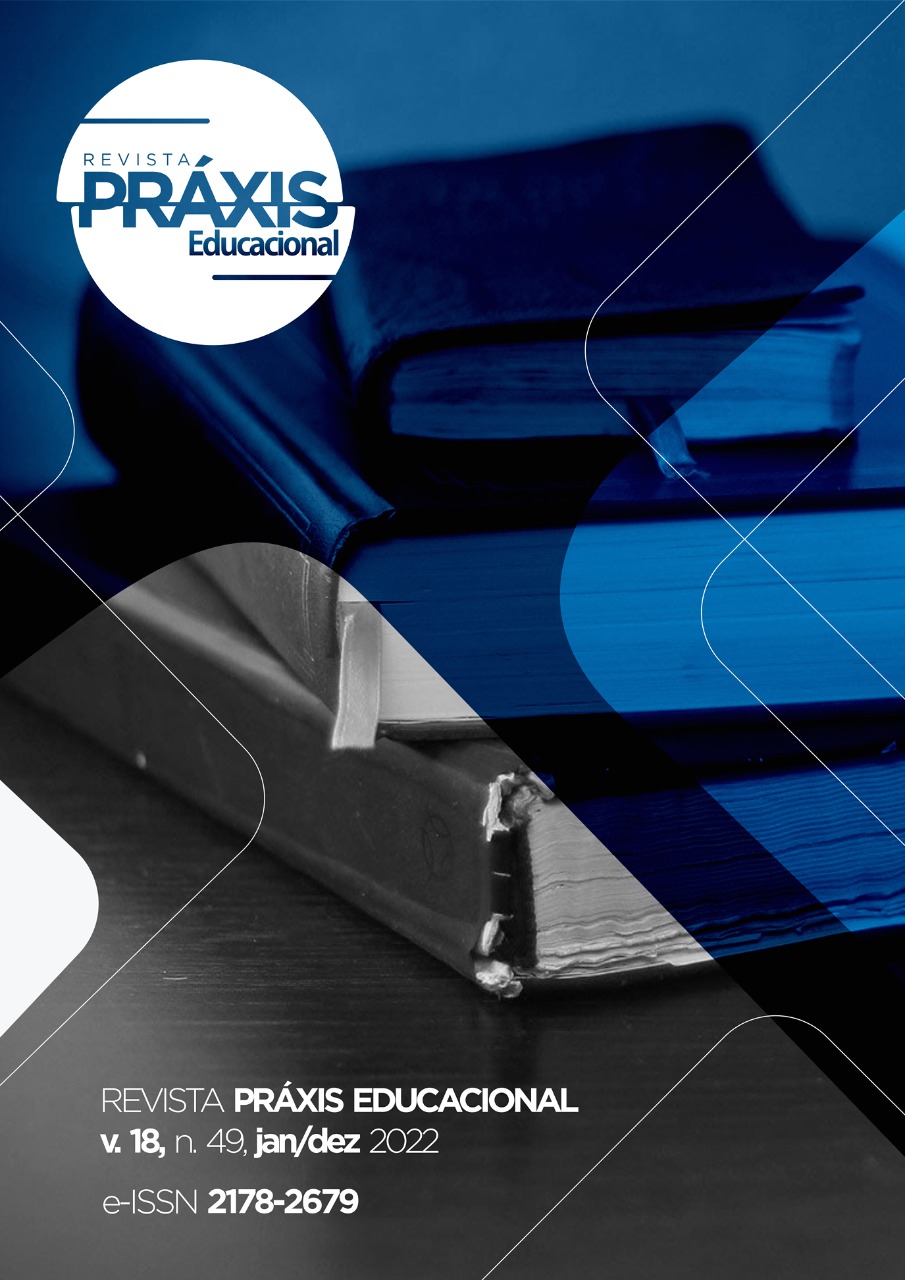An analysis of portuguese and brazilian curriculums from the perspective of history education
DOI:
https://doi.org/10.22481/praxisedu.v18i49.11353Keywords:
history education, curriculum, metahistorical conceptsAbstract
This article aims to analyze two curricular documents related to the teaching of History, the Essential Learnings (AE) approved in 2018 in Portugal and the Common National Curriculum Base Skills (BNCC) approved in 2017 in Brazil. We will carry out a qualitative analysis, using the methodological strategy of document analysis. At first, we will briefly contextualize both documents, verifying in which historical contexts they were approved and how the concepts of historical learning in both proposals are explained. Our analysis is part of the field of History Education, which in Portugal and Brazil has been constituted as a proposal for teaching history that articulates theory and practice in the perspective of the epistemology of history and which has been positioned as a field of study for a history teaching committed to democratic pluralism. In this sense, the analysis will focus on identifying key elements of the field of History Education in these curricular documents, such as the approach to meta-historical concepts, substantive concepts and the issue of controversial themes. We also established an analysis cutout in the 9th grade curricula in both countries on the approaches to the assumptions of historical learning presented by the curriculum documents.
Downloads
Metrics
References
BARCA, Isabel. Educação Histórica: vontades de mudança. Educar em Revista, n. 42, 2011. p. 59-71. Disponível em: https://www.scielo.br/j/er/a/9Y39tCG5wd7wcz9FfSHXjLF/?lang=pt#ModalArticles. Acesso em: 3 out. 2021.
BERTOLINI, João da Silva; MIRANDA, Thiago de Carvalho; SANTOS, Fábio Aparecido dos. Evidência. In: SCHMIDT, Maria Auxiliadora; SOBANSKI, Adriane de Quadros (org.). Competências do pensamento histórico. Curitiba: W. A. Editores, 2020. p. 75-98.
BLOOM, Benjamin Samuel. Taxonomy of Educational Objectives, Handbook I: The Cognitive Domain. Nova York: David McKay Co Inc, 1956.
BORRIES, Bodo von. Jovens e consciência histórica. Curitiba: W.A. Editores, 2018.
BRASIL. Ministério da Educação. Base Nacional Comum Curricular. Versão final.
Brasília: MEC, 2018. Disponível em: http://basenacionalcomum.mec.gov.br/. Acesso em: 3 out. 2021.
CAINELLI, Marlene. Significância histórica. In: SCHMIDT, Maria Auxiliadora; SOBANSKI, Adriane de Quadros (org.). Competências do pensamento histórico. Curitiba: W.A. Editores, 2020. p. 153-161.
DGE-AE. Aprendizagens Essenciais – História – 9° ano. Portugal, Ministério da Educação, 2018. Disponível em: https://www.dge.mec.pt/sites/default/files/Curriculo/Aprendizagens_Essenciais/3_ciclo/historia_3c_9a_ff.pdf. Acesso em: 12 set. 2022.
DGE-PA. Despacho nº 6478/2017. Perfil dos Alunos à Saída da Escolaridade Obrigatória. Portugal, Ministério da Educação, 2017. Disponível em: https://dge.mec.pt/sites/default/files/Curriculo/Projeto_Autonomia_e_Flexibilidade/perfil_dos_alunos.pdf. Acesso em: 12 set. 2022.
FRONZA, Marcelo. Consciência histórica, consciência moral em relação com a natureza para uma didática humanista da história em Jörn Rüsen. MÉTIS – história & cultura. v. 19, n. 38, p. 81-97, jul./dez. 2020. Disponível em: http://www.ucs.br/etc/revistas/index.php/metis/article/view/9989. Acesso em: 3 out. 2021.
GUSMÃO, Leslie Luiza Pereira; SUKOW, Nikita Mary. Orientação temporal. In: SCHMIDT, Maria Auxiliadora; SOBANSKI, Adriane de Quadros (org.). Competências do pensamento histórico. Curitiba: W.A. Editores, 2020.
LEE, Peter. Nós fabricamos carros eles tinham que andar a pé”: compreensão das pessoas do passado. In: Jornadas Internacionais da Educação Histórica, 2, 2003. Braga, Actas[...] Braga: Universidade do Minho, 2003. p. 19-35.
MARTINS, Maria do Carmo. Paradoxos entre políticas e a construção do coletivo: currículo e a história ensinada. In: RIBEIRO JÚNIOR, Halferd Carlos; VALÉRIO, Mairon Escorsi (org.). Ensino de História e Currículo: reflexões sobre a Base Nacional Comum Curricular, formação de professores e prática de ensino. Jundiaí: Paco Editoria, 2017. p. 47-66.
RÜSEN, Jörn. Teoria da História: uma teoria da história como ciência. Curitiba: Editora UFPR, 2015.
SCHMIDT, Maria Auxiliadora. Cidadania e Educação Histórica: diálogos com documentos curriculares brasileiros. In: Diálogo(s), Epistemologia(s) e Educação Histórica: um primeiro olhar. Porto: CITCEM, 2021. p. 37-57.
SILVA, Carla Gomes da; SOUSA, Claudio Aparecido de; SCORSATO, Sergio Antônio. Conceitos substantivos e formação do pensamento histórico. In: SCHMIDT, Maria Auxiliadora; SOBANSKI, Adriane de Quadros (org.). Competências do pensamento histórico. Curitiba: W.a. Editores, 2020. p. 55-74.
SOLÉ, Glória. As competências específicas no ensino da História: a dimensão da temporalidade para a compreensão histórica. CLIO. v. 43. p. 89-112. 2017. Disponível em: https://repositorium.sdum.uminho.pt/bitstream/1822/49470/1/nonografico2017_5%20Gl%c3%b3ria%20Sol%c3%a9.pdf. Acesso em: 3 out. 2021.
SOLÉ, Glória. Ensino da História em Portugal: o currículo, programas, manuais escolares e formação docente. El Futuro del Pasado, n. 12, p. 21-59, 2021. Disponível em: https://revistas.usal.es/index.php/1989-9289/article/view/fdp2021122159. Acesso em: 3 out. 2021.
WINEBURG, Sam; SCHNEIDER, Jack. Was Bloom’s Taxonomy Pointed in the Wrong Direction? Kappan v. 91. n. 4. p. 56-61, 2010.
Downloads
Published
How to Cite
Issue
Section
License
Copyright (c) 2022 Práxis Educacional

This work is licensed under a Creative Commons Attribution-ShareAlike 4.0 International License.
You are free to:
Share - copy and redistribute the material in any medium or format; Adapt - remix, transform, and build from the material for any purpose, even commercially. This license is acceptable for Free Cultural Works. The licensor cannot revoke these freedoms as long as you follow the terms of the license.
Under the following terms:
Attribution - You must appropriately give credit, provide a link to the license, and indicate if any changes have been made. You may do so in any reasonable way, but not in a way that suggests that you or your use is endorsed by the licensor.
There are no additional restrictions - You cannot apply legal terms or technological measures that legally restrict others to make any use permitted by the license.










